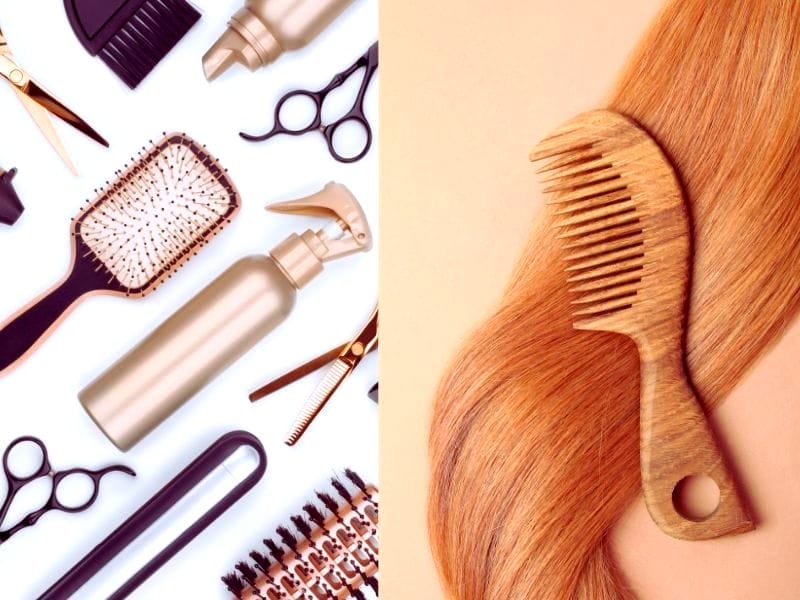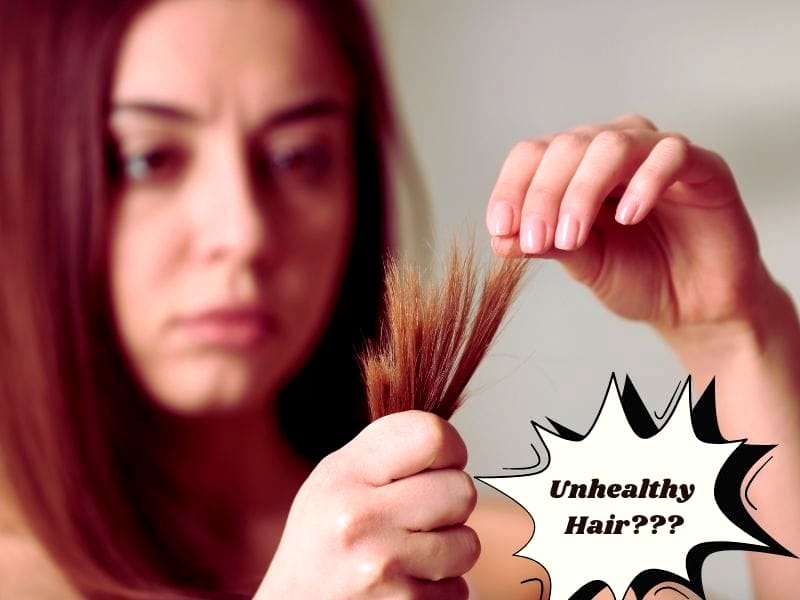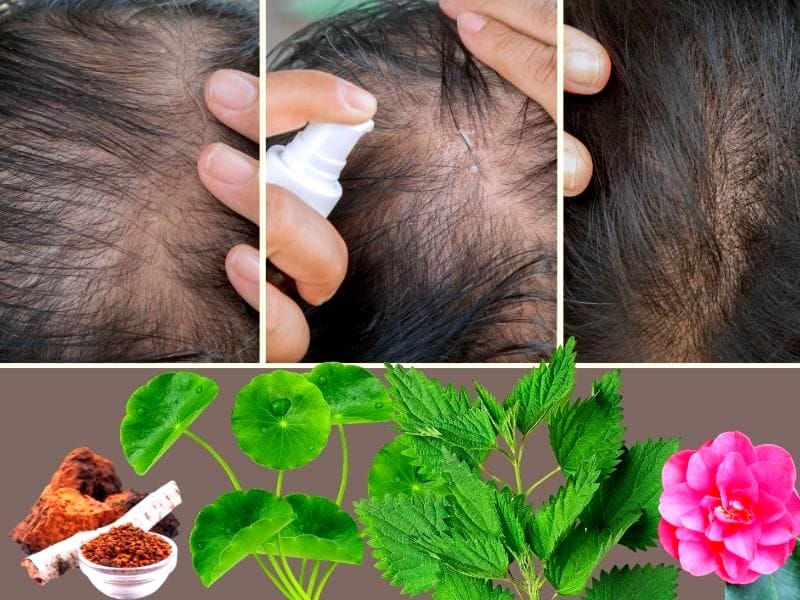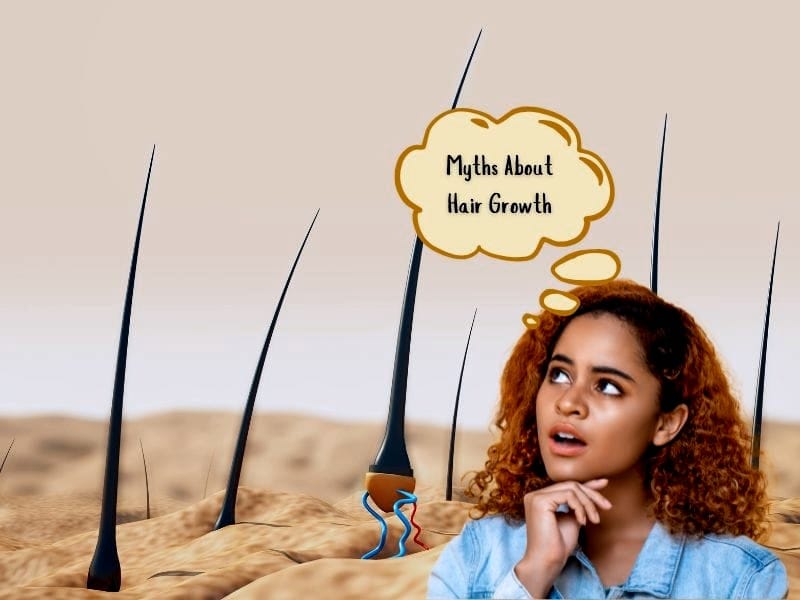Helping clients achieve thick, healthy hair requires more than just recommending products—it’s about educating them on the right habits, treatments, and hair care solutions. From understanding hair growth cycles to choosing the best natural ingredients, salon professionals can guide clients toward long-term hair health. This guide breaks down the science of hair growth, essential hair care practices, and how salons can incorporate hair treatments to help clients achieve stronger, fuller hair.
Introduction

Thick, healthy hair is one of the most common beauty goals for clients, yet many struggle to achieve it. Hair challenges can be frustrating and disheartening, from slow growth to excessive shedding. However, clients can transform their hair over time with the right guidance and salon expertise.
As a salon professional, your role extends beyond providing haircuts and styling—you are also a trusted advisor in your client’s hair care journey. By educating clients on proper hair maintenance, recommending the best natural treatments, and incorporating effective salon services, you can help them achieve the healthy, voluminous hair they desire.
Understanding Hair Growth: The Science Behind Healthy Hair
Hair growth follows a natural cycle consisting of four phases: anagen (growth), catagen (transition), telogen (resting), and exogen (shedding). The length and health of a person’s hair depend on how long it stays in the growth phase. If hair appears thin or stagnant in length, it is often due to a shortened anagen phase or excessive shedding.
Scalp health plays a crucial role in determining the thickness and vitality of hair. A clean, well-nourished scalp promotes a healthy environment for follicles to thrive, resulting in stronger hair growth. While genetics influence hair structure, the right care routine can significantly improve hair density and prevent premature thinning.
Why Clients Struggle with Thin or Unhealthy Hair

Several factors contribute to thinning hair, including stress, hormonal imbalances, diet deficiencies, and lifestyle habits. External stressors such as pollution and heat styling can also weaken the hair shaft, leading to excessive breakage and dullness. Addressing these concerns requires a holistic approach that includes both internal and external care.
Many clients unknowingly damage their hair with over-processing, chemical treatments, and poor product choices. Harsh sulfates, parabens, and alcohol-based styling products strip the hair of natural moisture, making it more prone to breakage. By educating clients on safer alternatives, salons can help them rebuild stronger, healthier hair over time.
Essential Hair Care Practices for Stronger, Thicker Hair
Proper cleansing routines are essential for maintaining hair health. Clients should avoid overwashing, as frequent shampooing can strip the scalp of natural oils, causing dryness and breakage. Instead, washing 2-3 times per week with sulfate-free shampoos helps preserve hydration while keeping the scalp clean.
Scalp massages are a simple yet effective way to stimulate blood circulation and promote hair growth. Massaging the scalp for a few minutes during shampooing can enhance nutrient absorption at the follicles, leading to stronger and healthier hair. Using lukewarm water instead of hot water also helps maintain the scalp’s moisture balance, preventing unnecessary dryness.
The Best Ingredients for Hair Growth and Strength

Biotin, collagen, and keratin are essential for maintaining the structural integrity of hair strands. These ingredients work by reinforcing the protein bonds within hair, making it more resilient to breakage. Clients looking to boost hair strength should incorporate hair products enriched with these key nutrients.
Essential oils such as rosemary, peppermint, castor oil, Centella Asiatica, nettle extract, camellia japonica, and chaga mushroom provide natural nourishment for hair growth. These botanical extracts improve circulation to the scalp, strengthen the roots, and prevent excessive shedding. Additionally, plant-based proteins from quinoa, rice, and pea protein help fortify hair strands, making them less prone to damage.
Top 10 Hair Growth Hacks
1. Your Hair Grows to the Limit Your Routine Supports
If hair isn’t getting longer, it’s not because it stopped growing—it’s breaking off. Clients need a strong hair care routine that supports length retention. The right balance of moisture, protection, and minimal damage will allow hair to grow to its full potential.
2. Most Hair Products Do More Harm Than Good
Many hair products contain harsh ingredients that strip natural oils, leading to weaker strands. Using heavy styling products can cause buildup, making hair greasy and requiring frequent washing. Encourage clients to choose sulfate-free, nourishing formulas tailored to their hair type.
3. Frequent Trims Don’t Help Hair Growth
The myth that cutting hair makes it grow faster has been debunked. While trimming prevents split ends, it does not accelerate growth. Instead of frequent trims, clients should focus on strengthening hair to prevent breakage and retain length.
4. Uneven Product Application Can Damage Hair
Applying products unevenly can create weak, dry spots in the hair. Clients should distribute conditioner and leave-in treatments evenly using both hands. Focusing only on the outer layers while ignoring inner sections leads to uneven moisture retention.
5. Hair Has a Genetic Growth Limit
Every person has a genetic maximum hair length. If a client’s hair appears thin at the ends but thick at the roots, they may be nearing their genetic limit. However, optimizing their routine can help them maximize their full potential.
6. Nutrient Deficiency Can Stop Hair Growth
Hair health is directly linked to nutrition. Clients who lack essential vitamins like iron, zinc, and vitamin D often experience excessive shedding. A balanced diet rich in proteins and omega-3 fatty acids supports long-term hair growth.
7. Scalp Massage Boosts Growth
Massaging the scalp stimulates circulation, delivering oxygen and nutrients to hair follicles. A few minutes of firm but gentle massage during shampooing can improve overall hair thickness. However, excessive or aggressive massage can lead to irritation.
8. Hair Masks Can Reverse Damage
Coloring, heat styling, and overwashing strip moisture from hair. Using a deep-conditioning mask once a week helps restore hydration and repair damage. Clients should apply masks after color treatments or excessive washing to prevent dryness.
9. Core Hair Care Routine (The Trinity Routine)
A simple but effective hair routine consists of:
- Shampoo to cleanse and promote scalp health.
- Leave-in conditioner to strengthen mids and prevent breakage.
- Hair oil to protect ends and retain length.
10. Protective Styling Helps Retain Length
Minimizing heat styling and wearing protective hairstyles reduces breakage. Clients should use silk pillowcases and wide-tooth combs to prevent unnecessary damage while sleeping and detangling.
How to Educate Clients on Long-Term Hair Health

Educating clients on long-term hair health starts with personalized consultations. By understanding their unique hair needs, stylists can recommend the right products and techniques. This empowers clients to make informed decisions and maintain healthy hair at home. Clients appreciate the guidance and feel more confident in their hair care routine.
Salons can also offer workshops to teach clients the basics of hair growth and scalp health. These sessions help clients understand which ingredients work best for their hair. Education builds trust and encourages clients to stick to a routine. When clients know what’s best for their hair, they are more likely to achieve long-term results.
Addressing Common Myths About Hair Growth

A common myth is that cutting hair makes it grow faster, but trimming does not impact hair growth. While regular cuts help maintain the appearance of healthy hair by preventing split ends, hair growth is determined by factors like genetics and overall hair care. Another misconception is that more shampoo equals cleaner hair. Overwashing strips the scalp of natural oils, leading to dryness and an overproduction of sebum, which can result in an oily scalp and weakened hair.
Many also believe oils make hair greasy, but the right oils, such as argan and coconut oil, can improve scalp health and promote hair growth. These oils nourish the scalp, provide moisture, and support healthy follicles, without making hair greasy when used properly. A balanced approach to hair care, with minimal washing and the right oils, helps maintain strong, healthy hair.
FAQs
What are the best hair products for promoting hair growth?
The best hair products for promoting hair growth include sulfate-free shampoos, biotin-infused conditioners, and scalp serums with natural stimulants like rosemary oil, caffeine, and castor oil. Look for formulas enriched with plant-based proteins and antioxidants to strengthen hair strands and reduce breakage.
How often should clients wash their hair for optimal thickness?
The ideal hair washing frequency depends on hair type. Fine or oily hair may require washing every other day, while thicker, curly, or dry hair benefits from washing 2-3 times per week. Over washing can strip natural oils, leading to dryness and breakage.
Can diet alone improve hair thickness?
Yes! A nutrient-rich diet plays a crucial role in hair health. Consuming protein-rich foods, iron, zinc, omega-3 fatty acids, and vitamins like biotin and vitamin D supports hair growth and prevents excessive shedding. Hydration is also key to maintaining scalp health.
Do natural hair treatments really work for hair growth?
Absolutely! Natural hair treatments with ingredients like Centella Asiatica, nettle extract, camellia japonica, chaga mushroom, castor oil, and green tea extract nourish the scalp, reduce inflammation, and promote hair follicle health. Regular use of natural treatments can improve hair density and strengthen weak strands.
What’s the best way to prevent hair thinning as clients age?
To prevent hair thinning with age, clients should focus on a holistic hair care routine that includes gentle styling, regular scalp massages, and the use of strengthening hair treatments. Avoiding heat styling, using silk pillowcases, and incorporating hair growth serums with Centella Asiatica, nettle extract, camellia japonica, and chaga mushroom can also help maintain thickness.
Final Thoughts
Helping clients achieve thick, healthy hair requires a holistic approach that includes proper hair care routines, salon treatments, and the right product recommendations. Salons that prioritize scalp-focused treatments and high-quality, natural hair care products will gain a loyal client base.
By offering expert guidance, promoting safe and effective products, and educating clients on best practices, your salon can become a trusted destination for hair transformation. Sign up now for exclusive insights, tips, and personalized product recommendations today—let’s help your clients achieve the beautiful, voluminous hair they deserve! Wondering what product I’m talking about? Get in touch with us today and see for yourself why it’s making such a big difference!

